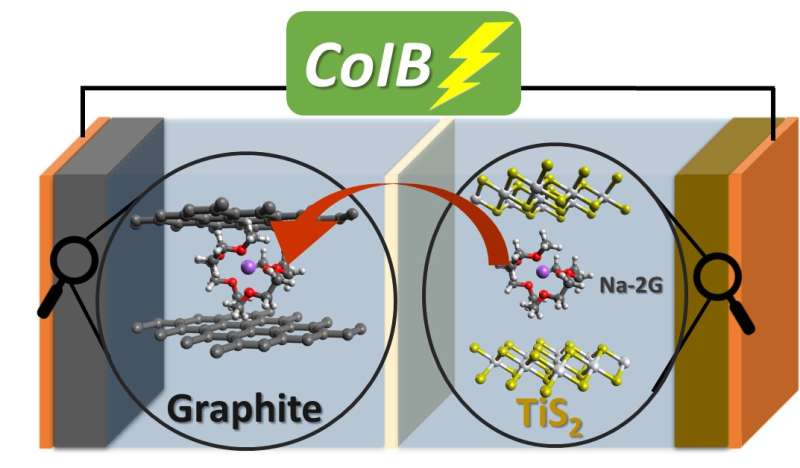Researcher investigate batteries without critical raw materials

The market for rechargeable batteries is growing rapidly, but the necessary raw materials are limited. Sodium-ion batteries, for example, could offer an alternative. A joint research group from HZB and Humboldt-Universität zu Berlin has investigated new combinations of electrolyte solutions and electrode materials for this purpose.
“In contrast to lithium-ion batteries, which are based on the storage of lithium ions in the positive and negative electrodes of the battery, we are working on the one hand with sodium ions, as they also occur in cheap table salt. On the other hand, we store the sodium ions together with their solvate shell, i.e. solvent molecules from the electrolyte solution that separate the two electrodes. This makes it possible to realize completely new storage reactions,” explains Prof. Philipp Adelhelm, who heads the research group “operando battery analysis,” which was jointly founded by Humboldt University and Helmholtz-Zentrum Berlin in 2020.
The storage of ions when accompanied by their solvation shell in a crystal lattice is referred to as co-intercalation. Up to this point, this concept was limited to the negative electrode of the sodium-ion battery. Now the researchers around Adelhelm have succeeded in extending the concept to the positive electrode of the battery.
Dr. Guillermo A. Ferrero, first author of the publication, explains: “With titanium disulfide and graphite, we have for the first time combined two materials that absorb and release the same solvent during charging and discharging of the battery.”
The scientists could observe changes in the material during charging and discharging via operando measurements performed in the X-Ray Core Lab at HZB on the LIMAX 160. This helped them to assign the co-intercalation mechanism inside the battery. They could then use this new knowledge to realize a battery with two electrodes that both rely on reversible co-intercalation of solvent molecules.
“We are still in the early stages of understanding the implications of the co-intercalation batteries. But there are a few possible advantages we can envision,” Dr. Katherine A. Mazzio, HZB, explains. “The process of co-intercalation could improve upon efficiency by enabling better low temperature performance. It could also be utilized to improve upon alternative cell concepts such as using multi-valent ions instead of Li+ or Na+ storage that are particularly sensitive to the solvation shell.”
The research was published in Advanced Energy Materials.
Guillermo Alvarez Ferrero et al, Co‐Intercalation Batteries (CoIBs): Role of TiS 2 as Electrode for Storing Solvated Na Ions, Advanced Energy Materials (2022). DOI: 10.1002/aenm.202202377
Citation:
Researcher investigate batteries without critical raw materials (2022, October 27)
retrieved 27 October 2022
from https://techxplore.com/news/2022-10-batteries-critical-raw-materials.html
This document is subject to copyright. Apart from any fair dealing for the purpose of private study or research, no
part may be reproduced without the written permission. The content is provided for information purposes only.
For all the latest Technology News Click Here
For the latest news and updates, follow us on Google News.
